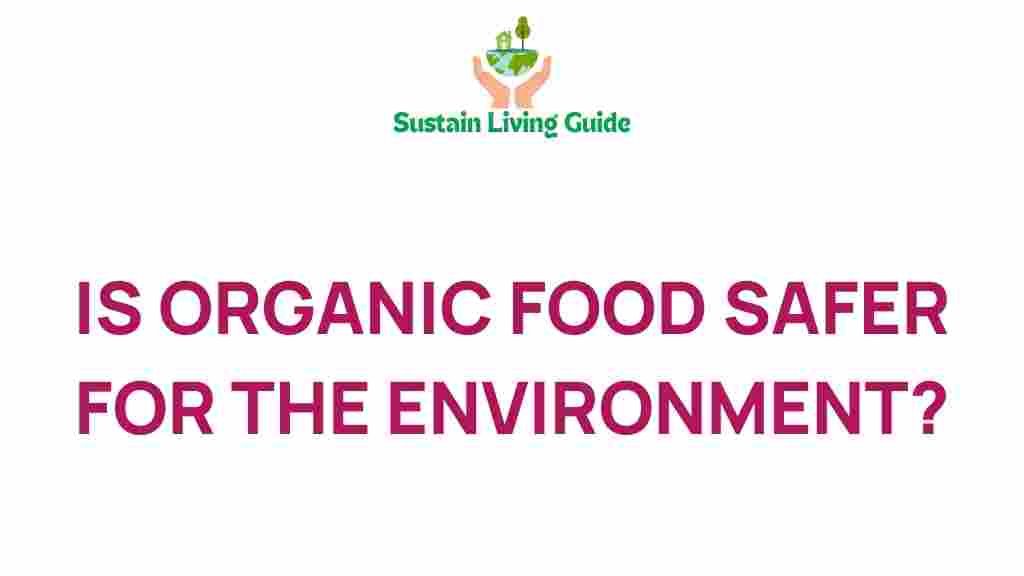Is Organic Food Truly Safer for Our Planet?
In recent years, the popularity of organic food has surged, with many consumers believing that these products are not only better for their health but also for the planet. However, the question remains: is organic food truly safer for our planet? This article aims to unpack the myths surrounding organic food and provide a comprehensive understanding of its environmental impact.
What is Organic Food?
Organic food refers to produce and other food products that are grown and processed without the use of synthetic fertilizers, pesticides, genetically modified organisms (GMOs), and artificial chemicals. Instead, organic farming practices focus on natural methods to enhance soil fertility and control pests.
The Environmental Benefits of Organic Food
Proponents of organic food argue that it offers several environmental benefits, including:
- Reduced Chemical Use: Organic farming avoids synthetic pesticides and fertilizers, which can contaminate soil and waterways.
- Biodiversity: Organic farms often support a greater variety of crops and wildlife, contributing to healthier ecosystems.
- Soil Health: Organic practices enhance soil quality through crop rotation and composting, leading to better water retention and reduced erosion.
- Less Energy Consumption: Organic farming generally requires less energy input than conventional farming, leading to a smaller carbon footprint.
Myths About Organic Food
Despite the perceived benefits, several myths about organic food persist that can cloud consumer judgment. Here are some common misconceptions:
Myth 1: Organic Food is Always Better for the Environment
While organic practices are generally more sustainable, not all organic farms operate under the same standards. For instance, some large-scale organic farms may still employ practices that can harm the environment.
Myth 2: Organic Food is Pesticide-Free
Although organic farming limits synthetic pesticides, it does not eliminate pesticides altogether. Organic farmers use natural pesticides, which can still affect biodiversity and non-target species.
Myth 3: Organic Food is More Nutritional
Studies comparing the nutritional content of organic and conventional foods have shown mixed results. While some organic foods may contain higher antioxidant levels, the differences are often minimal.
Environmental Impacts of Conventional Farming
To understand the potential benefits of organic food, it is essential to look at the environmental impacts of conventional farming:
- Pesticide Runoff: Chemicals from conventional farms can run off into nearby waterways, causing pollution and harming aquatic ecosystems.
- Soil Degradation: Intensive farming practices can deplete soil nutrients, leading to long-term agricultural sustainability issues.
- Greenhouse Gas Emissions: Conventional agriculture contributes significantly to greenhouse gas emissions through fertilizers and livestock production.
The Role of Organic Food in Sustainable Agriculture
Organic food plays a crucial role in sustainable agriculture, which seeks to balance environmental health, economic profitability, and social equity. Here’s how organic farming aligns with sustainability goals:
- Encouraging Local Economies: Organic farming often supports local economies through community-supported agriculture (CSA) programs.
- Promoting Climate Resilience: Organic farming practices can enhance the resilience of farming systems to climate change impacts.
- Educating Consumers: Organic food movements often emphasize the importance of knowing where food comes from, fostering a more informed consumer base.
Choosing Organic Food: What to Consider?
When deciding whether to choose organic food, consider the following factors:
- Source: Always check where the food is sourced. Local organic farms may have a smaller carbon footprint than imported organic produce.
- Seasonality: Purchase organic foods that are in season to ensure freshness and minimize environmental impact.
- Certifications: Look for recognized organic certifications, which can provide assurance of the farming practices used.
Step-by-Step Process for Transitioning to Organic Food
If you’re considering incorporating more organic food into your diet, follow these steps:
- Research: Learn about local organic farms and markets in your area.
- Start Small: Begin by choosing organic options for produce that are known to have higher pesticide residues.
- Experiment: Try different organic products to identify which ones you enjoy and find most beneficial.
- Plan Meals: Create meal plans that incorporate organic ingredients, ensuring a balanced diet.
- Connect with Community: Join local food co-ops or CSA programs to support local organic farms.
Troubleshooting Tips for Organic Food Purchases
While shopping for organic food, you may encounter challenges. Here are some common issues and how to address them:
- High Prices: Organic food can be more expensive. Look for sales, and consider buying in bulk to save money.
- Limited Availability: Some areas may have limited access to organic food. Explore online options or local delivery services.
- Quality Concerns: If you receive poor-quality organic produce, contact the supplier to address your concerns.
The Future of Organic Food
The future of organic food looks promising as more consumers become aware of environmental issues. However, several factors will influence its growth:
- Consumer Education: As consumers become more educated about food sourcing and farming practices, demand for organic food could increase.
- Policy Changes: Government policies that support organic farming can help create a more sustainable agricultural system.
- Technological Advancements: Innovations in organic farming techniques may improve yields and reduce costs, making organic food more accessible.
Conclusion
So, is organic food truly safer for our planet? The answer is complex. While organic farming generally offers several environmental benefits compared to conventional practices, it is essential to recognize that not all organic food is created equal. By understanding the myths and realities surrounding organic food, consumers can make informed choices that align with their values.
Ultimately, supporting local organic farms, prioritizing sustainable practices, and being mindful of consumption habits can contribute positively to the health of our planet. For further reading on sustainable farming practices, check out this comprehensive guide.
Remember, every choice matters in the journey towards a healthier planet. Whether you choose organic food or not, being informed is the first step to making environmentally responsible decisions.
For more tips on incorporating organic food into your diet, visit our resource page.
This article is in the category Eco-friendly and created by SustainLivingGuide Team
